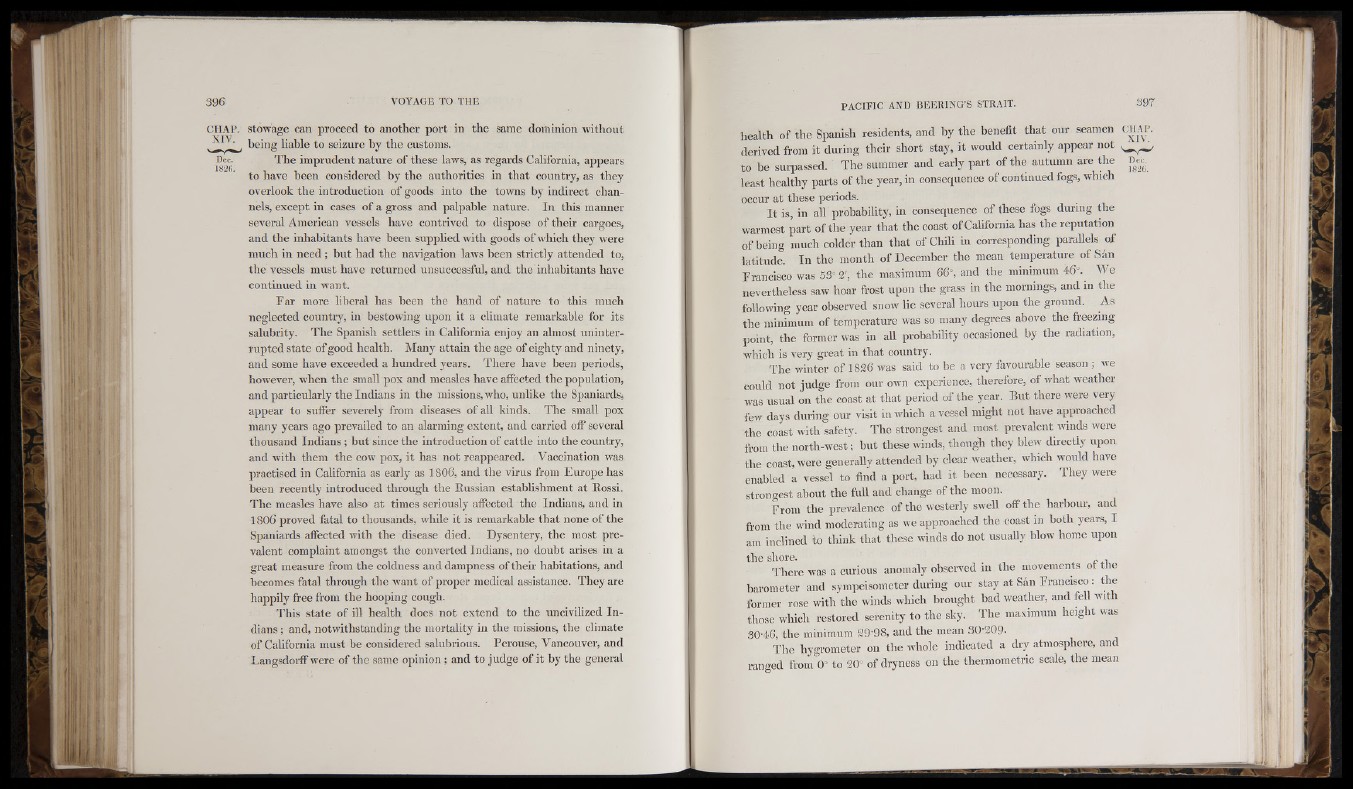
i É I '
í,.
f
: i'istowage
can proceed to another port in the same dominion without
being liable to seizure by the customs.
The imprudent nature of these laws, as regards California, appears
to have been considered by the authorities in that country, as they
overlook the introduction of goods into the towns by indirect channels,
except in cases of a gross and palpable nature. In this manner
several American vessels have contrived to dispose of their cargoes,
and the inhabitants have been supplied with goods of which they were
much in need ; but had the navigation laws been strictly attended to,
the vessels must have returned unsuccessful, and the inhabitants have
continued in want.
Far more liberal has been the hand of nature to this much
neglected country, in bestowing upon it a climate remarkable for its
salubrity. The Spanish settlers In California enjoy an almost uninterrupted
state of good health. Many attain the age of eighty and ninety,
and some have exceeded a hundred years. There liave been periods,
however, when the small pox and measles have affected the population,
and particularly the Indians in the missions, who, unlike the Spaniards,
appear to suffer severely from diseases of all kinds. The small pox
many years ago prevailed to an alarming extent, and carried off several
thousand Indians ; but since the introduction of cattle into the country,
and with them the cow pox, it has not reappeared. Vaccination was
practised in California as early as 1806, and the virus from Europe has
been recently introduced through the Russian establishment at Rossi.
The measles have also at times seriously affected the Indians, and in
1806 proved fatal to thousands, while it is remarkable that none of the
Spaniards affected with the disease died. Dysentery, the most prevalent
complaint amongst the converted Indians, no doubt arises in a
great measure from the coldness and dampness of their habitations, and
becomes fatal through the want of proper medical assistance. They are
happily free from the hooping cough.
This state of ill health does not extend to the uncivilized Indians
; and, notwithstanding the mortality in the missions, the climate
of California must be considered salubrious. Ferouse, Vancouver, and
Langsdorff were of the same opinion ; and to judge of it by the general
health of the Spanish residents, and by the benefit that our seamen C U A P .
derived from it during their short stay, it would certainly appear not
to be surpassed. The summer and early part of the autumn are the D™.
least healthy parts of the year, in consequence of continued fogs, which
occur at these periods.
It is, in all probability, in consequence of these fogs during the
warmest part of the year that the coast of California has the reputation
ofbeing much colder than that of Chili in corresponding paraUcls of
latitude. In the month of December the mean temperature of Sán
Francisco was 53" 2', the maximum 66°, and the minimum 46°. We
nevertheless saw hoar frost upon the grass in the mornings, and in the
following year observed snow lie several hours upon the ground. As
the raiiiimum of temperature was so many degrees above the freezing
point, the former was in all probability occasioned by the radiation,
W 'h ic h is very great in that country.
The winter of 1826 w'as said to be a very favourable season ; we
could not judge from our ow n experience, therefore, of what weather
was usual on the coast at that period of the year. But there were very
few days during our visit in which a vessel might not have approached
the coast with safety. The strongest and most prevalent winds were
from the north-west ; but these winds, though they blew directly upon
the coast, were generally attended by clear weather, which would have
enabled a vessel to find a port, had it been necessary. They were
strongest about the full and change of the moon.
From the prevalence of the westerly swell off the harbour, and
from the wind moderating as we approached the coast in both years, I
am inclined to think that these winds do not usually blow home upon
the shore.
There was a curious anomaly observed in the movements of the
barometer and sympeisometer during our stay at Sán Francisco ; the
former rose with the winds which brought bad weather, and fell with
those which restored serenity to the sky. The maximum height was
30-40, the minimum 29 98, and the mean 30-209.
The hygrometer on the whole indicated a dry atmosphere, and
ranged from'’o° to 20° of dryness on the thermometric scale, the mean
T m